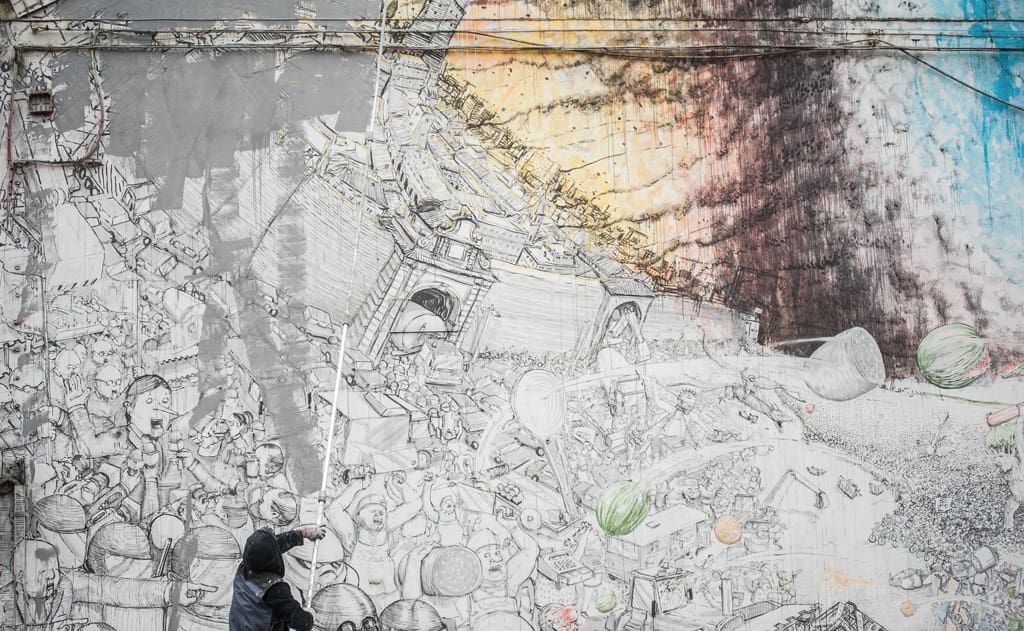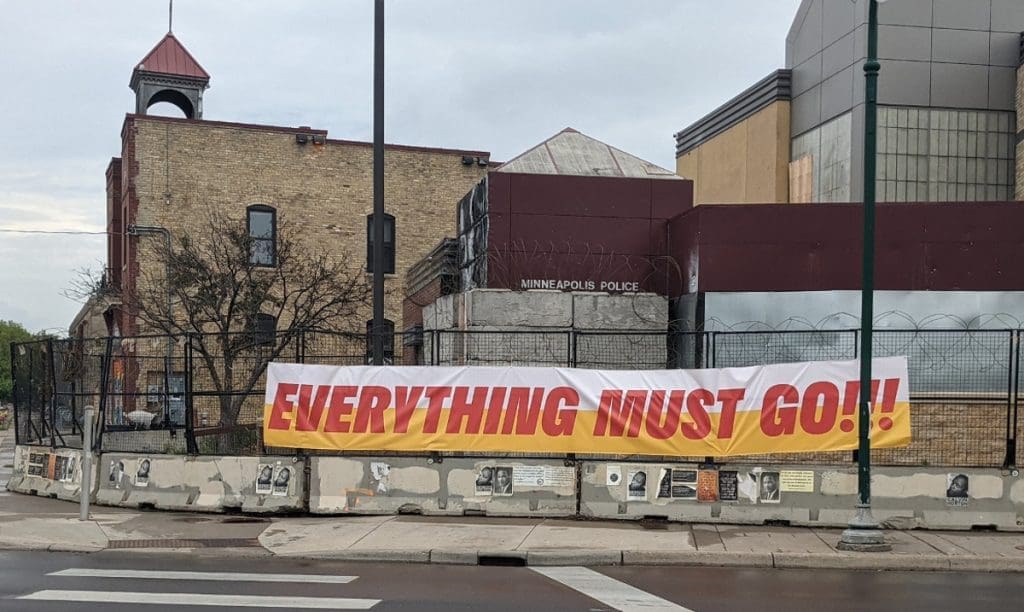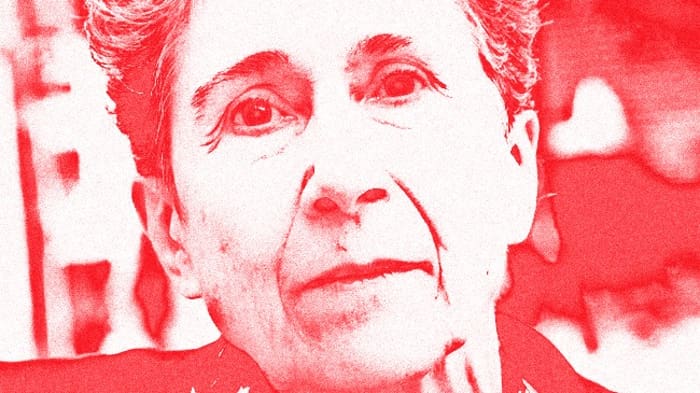Transcribed from the 12 November 2019 episode of This is Hell! Radio (Chicago) and printed with permission. Edited for space and readability. Listen to the whole interview:
The neoliberals’ project was much more than just to dismantle the social state and let markets fly. It was also a project to dismantle the entire order of the twentieth century aimed at producing social justice, social equality, political inclusion, and robust democracy, and to replace it with lean, mean, technocratic states that supported markets and allowed for the extension of “traditional morality.”
Chuck Mertz: Traditional morality has been weaponized, and valorization of markets has replaced what was democratic governance. With freedom and morality now confined to the right’s parameters, neoliberalism has become a Frankenstein that even its originators may not have foreseen. Here to help us better understand, political theorist Wendy Brown, author of In the Ruins of Neoliberalism: The Rise of Anti-Democratic Politics in the West.
Welcome to our show, Wendy, I really appreciate you being on with us.
Wendy Brown: It’s a pleasure to be here.
CM: You have a quote from Middlemarch right at the beginning of your book, by George Eliot: “The tyrannical spirit, wanting to play bishop and banker everywhere…”
Is neoliberalism tyranny? Is it cruel and oppressive control applied arbitrarily and unreasonably? Or is it more than that?
WB: I don’t actually think it’s tyranny. But I do think there’s a tyrannical spirit in it. The difference matters. For some years now I’ve been arguing that neoliberalism needs to be understood not just as a set of economic policies; not just as a particular way of deregulating markets or letting loose free enterprise, getting rid of progressive taxes, stripping out the welfare state—all those things are true, but it also needs to be understood as a form of reason, a form of reason that governs us even when there’s no tyrant holding over our heads a particular set of threats or even a particular set of instruments.
It’s the form of reason that I’m trying to get at in the last couple of books I’ve written, and especially in this one, where I’m really trying to explain something about neoliberalism’s contribution to the surge of explicitly anti-democratic politics that we’ve been facing for the last half-decade.
CM: What do you say to those who reject the very idea of neoliberalism, seeing it as a term that distracts from a larger critique of capitalism, seeing the term as completely unnecessary?
WB: The reason it’s necessary, in my view, is that it gets at a particular iteration of capitalism. It’s not that I want to say it’s very different from talking about capitalism in a general neo-Marxist frame. I want us to be able to understand that it does more than simply empower capital and de-power labor. Neoliberalism is a specific way of understanding states, societies, subjects, citizens—and above all it takes an explicitly anti-democratic project to get what it wants for economies and for the sphere of morality.
That’s what we’re going to talk about today, I think: that hard anti-democratic thrust at the heart of neoliberalism that’s different from what we usually mean by capitalism. Different people mean different things by it, but let’s take a rough left account of capitalism: we say it’s a form of private property ownership and retention in which capital has all the power and labor is exploited. Neoliberalism is a lot more than that.
CM: You write, “Centrists, mainstream neoliberals, liberals, and leftists are reeling. Outrage and moralizing satire, in vain hopes that internal factions or scandals on the right will yield self-destruction, are far more prevalent than serious strategies for challenging these forces with compelling alternatives. We even have trouble with the naming. Is this authoritarianism? Fascism? Populism? Illiberal democracy? Undemocratic liberalism? Rightwing plutocracy? Or something else?”
What explains that reaction by the left, if you will, to the rise of the right? Why is the rise of the right seen as an anomaly, a movement that will inevitably fall and fail? What does that tell you about the way that liberals react to neoliberalism?
WB: Two things. One is that for the most part, leftists who reject things like the idea of neoliberal reason (and say we’re just dealing with capitalism) are still holding out for an understanding of true consciousness to surface from what they understand to be the “false consciousness” of those who have gone for Bolsonaro or Trump or Brexit or other things. They still imagine there is a true set of interests of the working class—they still imagine there is a working class—and they still imagine that this bundle of lies and mystifications that opportunistic plutocrats have managed to capture the working class with will be exploded by the truth, by what’s really real.
The other thing that many imagine is that we’re still in a progressive narrative: we’re still progressing, even if we had a little hiccup over the last ten years, towards a world that is more enlightened, more free, and more egalitarian, and more fair and more just, and it’s just a matter of getting back on that train.
I reject both of those principles. To understand history properly you have to give up the progressive narrative altogether. That doesn’t mean that there isn’t progress in particular zones, like science or technology and so forth. But there’s no value “progress” orchestrating or guiding world history. We need to understand and appreciate that in order to understand and appreciate also why so many who were woefully deprived of futures and adequate ways of life by neoliberal economic effects turned right instead of turning left.
We need to be able to grasp the other kinds of forces at work, besides progress and besides economic interests. Organized people’s beliefs and values, political attachments, and (this part is important) their rancor, their resentment, their reproach of certain kinds of forces in the present that they take to be responsible for their misery, aren’t about those at the top, but are elsewhere.
The particular form of today’s anti-democratic rightwing rebellion is simultaneously libertarian and ethno-nationalist. How do those work together? That is really different from old-style fascism.
CM: You write, “Already galled by an elegant black family in the white house, disgruntled whites were also fed a steady diet of rightwing commentary by Fox News, talk radio, and social media, inflected from the fringes as a potpourri of previously isolated movements: white nationalists, libertarian, anti-government, and fascists connected with each other via the internet.”
Is it all rightwing media’s fault? What mistake do we make by simply blaming this only and exclusively on Fox News?
WB: Let me get to the heart of the thesis in this book, and at the same time acknowledge the sectoralization of the media—and by that I don’t just mean the fact of Fox News, but the fact that there is a Fox News constituency that is only a Fox News constituency, just as there is a Rachel Maddow constituency that never looks at Fox News. All of that has made a difference. All of that has poured fuel on the fire.
But my argument—roughly, compressed—goes like this: neoliberalism made life systematically worse for most in the middle and working classes of the Global North, and that was a given from the time those policies were first rolled out. The original architects of neoliberalism understood full well that a rising tide does not lift all boats. They understood full well that capital chasing cheap labor, cheap resources, new markets, and new sites of production in the Global South (what global free trade was supposed to do) would in fact depress the conditions of existence for those in the Global North who were in the laboring classes, the middle and working classes. When, on top of that, you strip out the welfare state and all the supports that those classes had, including access to free, quality higher education, that depression of current and future prospects is intensified.
So that’s the economic story. But what else? The other thing that neoliberalism does is launch a full-on assault on robust democracy. The neoliberals understood from the beginning that democracy, if given its way, would inevitably be redistributive, and would inevitably engage in social justice programs (economic, cultural, social, you name it) that would benefit the disadvantaged. And if the neoliberals (all the different schools of neoliberalism—the one we call the Chicago School, Milton Friedman; the one we call the Austrian School, Hayek; the one Americans don’t know as much about called the Ordoliberal School, basically the current structure of the European Union) all agreed on two things it was these: what must govern societies is not states and not legislatures and not “the people,” but markets on the one hand and traditional morality on the other. Because both of these are spontaneously evolved orders of cooperation and organization that don’t involve anybody’s idea of the Good. They just evolve from what works and what is effective and what is sustained over time. So the state should get out of the way.
The other thing that they all agreed on was that this meant you had to limit democracy. You had to essentially say that all legislatures should do is make universal rules, support markets, and support traditional morality; and all that democratic people should do is vote. Nothing more. Not legislate, not intervene, not engage in social justice projects, not produce egalitarianism at the political or social level (let alone the economic level).
Their project was much more than just to dismantle the social state and let markets fly. It was also a project to dismantle the entire order of the twentieth century aimed at producing social justice, social equality, political inclusion, and robust democracy, and to replace it with lean, mean, technocratic states that supported markets and allowed for the extension of “traditional morality.” Because traditional morality is the tried-and-true morality. Social justice is an intervention in it. Social justice is a distortion of traditional morality, just like redistribution is an intervention in markets.
That was the neoliberal project. How it actually pans out is another story. But part of the reason that you get a hard-right anti-democratic turn in response to neoliberal economic deprivation is that democracy itself has been radically delegitimated over the past forty years by neoliberal governing, by the belief that markets and morality ought to govern everywhere, by those principles instantiated in law, in courts, in court appointments, in legislative talk—what we have at this point is people who no longer believe in democracy, and think social justice is (as the right refers to it) totalitarianism. It’s the imposition of ideas of the few on the freedom of the many, and freedom means allowing traditional morality and markets to prevail.
CM: You write, “With its various inflections, this has become the left’s common sense since the political earthquake of November 2016. The narrative is not wrong but, I will argue, incomplete. It does not register the forces determining the radically anti-democratic form of the rebellion, and thus tends to align it with fascisms of old.”
How is this radically anti-democratic form of rebellion unlike the fascisms of old?
The idea that you could just get everybody signed on to a radically marketized world in which there are only winners and losers—the idea that everybody would go with it was naive. Why would we? Why would all the losers go with it?
WB: I separate my argument from those who say what we’ve got at this point is just an economically angry white male population that has turned its resentments against immigrants and racial minorities—Jews, Muslims, you name it—and that looks just like the story of the thirties.
Here’s the thing: the particular form of today’s anti-democratic rightwing rebellion is simultaneously libertarian and ethno-nationalist. How do those work together? That is really different from old-style fascism. They work together because freedom—of course, libertarian freedom—is at the heart of neoliberalism, and this principle has not only advanced freedom in the market (and attacked labor unions, and attacked any form of social organizing, and attacked any form of regulation of markets), but it’s also the principle that advances traditional morality: I have the right to my conservative Christian views, as an owner of a major corporation. I have the right to deprive my employees of a portion of insurance that would cover anything I disagree with (mainly a large swathe of technologies and pharmaceuticals that enable women’s reproductive freedom). I have a right, as a Christian baker, to deny my services to LGBT folks who are seeking to partner in marriage. I have a right, as an individual, to declare that I will not engage or participate in something that violates my Christian views.
The extreme of this today is William Barr, our attorney general, who said a couple weeks ago at Notre Dame University that he took his mission to be that of essentially re-Christianizing the United States, because any nation that tries to exist without belief in a single god and the traditional morality that the bible offers us is a nation on its way to degradation, deterioration, and the destruction of its own participation in civilization. He takes his mission as attorney general to be that of bringing Christianity back into not just his own immediate moral sphere but the public sphere: law, judicial appointments, and judicial decisions.
How does that work? That’s where you need the libertarianism, the right to assert your freedom to make this part of our world, not just your individual world. It’s what the philosopher and economist Friedrich Hayek called “extending the personal sphere” into what was the sphere of social justice, or the civic or the public sphere.
That doesn’t resemble fascisms of old at all. That’s really different. We don’t have a fascistic society that looks like a uniform society with the elimination of individual liberties and all power to the state—we have something different. I call it a plutocratic authoritarian liberalism. Authoritarianism from the state, but an authoritarianism that must respect the liberty that neoliberalism has set in motion in the spheres of markets and morals. That’s really different from fascism in Italy and Germany in the thirties.
CM: You’ve already touched on this a little bit, but I want to make sure our listeners understand this. Does the neoliberalism of Hayek and Friedman inevitably lead to the kind of fascism we see today?
WB: No. No, at least in the sense that it was not part of the plan. It certainly wasn’t their dream. Whatever we may think of their dream, these were guys who saw fascism and totalitarianism as the great dangers in the world, and were not trying to produce the kind of order that we’re seeing today in which there are opportunistic populist demagogues supported by an aroused citizenry making demands that are impossible to fulfill. That is what they were trying to quell.
Was it something in the way these guys thought (or didn’t think through certain parts of the program) that inevitably produced where we are today? No. There’s something that they didn’t think through, for sure, which is the whole domain of political life and political power. There’s something they didn’t think through in terms of how free markets actually work, and never stay free. And there’s certainly something they didn’t think through in terms of traditional morality.
But part of what is putting the whole problem on steroids today is a tremendous amount of racialized rancor, resentment, and nihilism. That is to say, we have a population that’s feeling like they’re not getting the future that the American dream was promising them. The white male middle and working class can “never quite get ahead,” can never quite get what they think is theirs—and on top of that, there’s a fiction that everybody else is getting ahead of them in line, everyone who is a different color and a different gender. So there is a whipped-up frenzy going on (and the Republican Party has been doing this for forty years, not just with racist dog whistles but with an overt play to this population, knowing that it’s the Republican Party’s last gasp). There is a whipping up of this rancor and resentment, and a produced fiction of who really is getting ahead. In fact, African-Americans suffered much more as a population from the neoliberal destruction of labor unions and the stripping out of the welfare state.
But there is this fiction, and at the same time there is this problem in Western civilization of a depressed value of truth, a depressed value of factuality, and a depressed value of morality as a result. That comes from something we could call secularization; we could call it disenchantment if we want to go with Weber—we could call it a lot of different things. But it comes from a slow and steady toppling of the foundations of morality, foundations that once upon a time took hold in an absolutely unshakeable certainty about god. That’s no longer the case. Science itself displaced that.
So what does that do? It produces a new problem, which is that there is still belief in traditional morality, but increasingly it’s weaponized, it’s instrumentalized, it’s treated as something that secures the supremacy that you’ve otherwise been stripped of. Because what does traditional morality guarantee? Patriarchy. “Native” or racialist entitlement. Ways of life that are ensured or protected over time that are allowed to be anointed as Good just because they are—that means segregationist or homogenist ways of life—and anything that disturbs them gets rejected.
What deregulating markets does, when those markets are already built atop a social structure that is both male-dominant and white-dominant, is reinforce that structure. And there’s no question that part of what neoliberalism did was reinforce that structure.
Now traditional morality is increasingly treated as that which re-secures those supremacies, re-secures those entitlements. But it does so in a way that has lost its foundation in god or belief or Christian goodness or anything else. It is, as you said at the top of the show, weaponized. That’s what we have in Trump. He is a beautiful model of this. Not because he doesn’t believe any of this stuff, but because he knows exactly how to weaponize it.
And we don’t just have it in Trump. We have it in Falwell, Jr. We have it in many church leaders. It’s in all kinds of folks who do not really care at all about the deep fiber in what we would call traditional morality, but are surely attached to the supremacies that it secures.
CM: I want to follow up on something you were saying about neoliberals not thinking through things like the way the economy actually works. What does that say to you about them, when they didn’t think it through, when they did not foresee what neoliberalism would become? Were they purposely ignoring these faults? Or were they just clueless?
WB: I think the latter. Different thinkers and leaders we can analyze differently here. But neoliberal economists—and remember that most economists for the last several decades have been essentially subscribing to the neoliberal view about markets: more markets, better markets, spread markets everywhere, everything you can marketize should be marketized, because markets are the best system of production, distribution, efficient price points, the rest of it. I think most of them really believed most of that. But they were not only clueless about the extent to which markets never really worked in the ways that they described in this ideal. They were also clueless about the political, social, cultural—and, I will add, theological—ramifications of a radically marketized world in which we have not justice, not democracy, but only winners and losers.
The idea that you could just get everybody signed on to a radically marketized world in which there are only winners and losers—the idea that everybody would go with it was naive. Why would we? Why would all the losers go with it? Markets are not really fair, they don’t really offer justice. Why wouldn’t there be political, social, cultural, theological reaction? What about the rest of things? The mistake that those folks made, if you want to give them the benefit of the doubt, was to imagine that markets could do all the work and you don’t have to think about anything else in human—let alone ecological—life.
CM: You write, “The current formation is relatively novel, differing from the authoritarianisms, fascisms, despotisms, or tyrannies of other times and places, and differing as well from conventional or known conservatisms. It thus rejects the language that much of the left uses to upbraid the right, as well as much of the language that the right uses to describe itself.”
Does neoliberalism, then, make the language of the left and right obsolete? Is that why neoliberalism has had such success?
WB: I want to be clear: I’m trying to get us to see some of the factors that have brought us to this pass that would quell some tired debates, like whether to continue with identity politics or abandon identity politics (like the Thomas Edsall view: just get rid of that stuff and go back to something he calls ‘economic issues,’ by which he means white working class identity politics); or whether what really brought us to this pass was a slow disintegration of checks and balances in political life that builds a so-called imperial presidency for which we’re now paying; or whether the real problem is that the right was really smart about think tanks and gerrymandering and voter suppression and all the other things that would secure its power even while its constituency was waning, whereas the left has been blindly marching around in the street with Code Pink and supporting the Sandinistas and Chavez and everything else. Those debates aren’t helping us right now.
None of them feature the extent to which democratic values themselves have been systematically assaulted—and by democratic values, I just mean the idea that people ought to legislate together the values concerning who we are, what we want to be, and so forth. Instead we handed that off to markets on the one hand, and traditional morality on the other, because that was the neoliberal governance that we were under.
We need to understand that that’s part of what brought us to this pass. And the simmering, racialized rancor of an increasingly dethroned white Euro-Atlantic working population is the other story that we need to bring to the fore. We need to put those two stories together: the anti-democratic thrust of neoliberalism and the simmering rancor that could easily be turned in an anti-immigrant, ethno-nationalist, anti-feminist, and of course anti-black, anti-brown direction. We need to put those together in order to think through our time.
CM: You write, “The founding texts rarely mentioned it, but white and male superordination are easily tucked into the neoliberal markets & morals project. On the one hand, deregulated markets tend to reproduce rather than ameliorate historically produced social powers and stratification. Racial and sexual divisions of labor are built into them. Gendered household labor is unpaid, for example, and it’s woefully underpaid market version—childcare, housecleaning, home healthcare, kitchen work—is disproportionately shouldered by minorities and immigrants.”
Is deregulation, then, a project to defend white supremacy and privilege?
WB: Indirectly, yes. Indirectly, what deregulating markets does, when those markets are already built atop a social structure that is both male-dominant and white-dominant, is reinforce that structure. And there’s no question that part of what neoliberalism did was reinforce that structure. On the other hand, there have been some who have argued that there are progressive neoliberals who took hold of a certain understanding of marketization and tried to use it to advance feminism (think Lean In), or used it to advance upward mobility among disenfranchised groups. I’m more inclined to say that when you put the traditional morality project into neoliberalism, along with the marketization-of-everything project, there’s no doubt that part of what it would do is resecure and reinforce traditional supremacies.
CM: Wendy, I really appreciate you being on our show this week. I cannot thank you enough.
WB: It was a great pleasure to talk with you. Thanks a lot.





